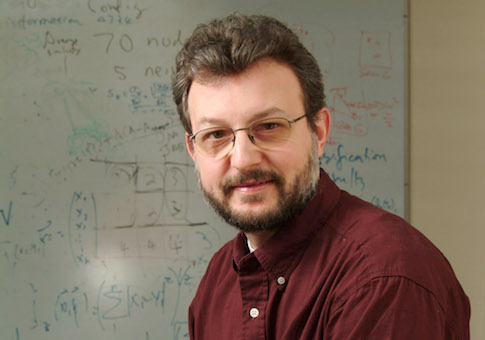The head researcher behind the government-funded project to track "misinformation" and "hate speech" online is now getting into the fact-checking business.
Filippo Menczer, a professor of informatics and computer science at Indiana University, explained during a lecture earlier this fall that he is creating a new system to go along with "Truthy" that he hopes can automatically extract tweets to be "fact-checked."
During his talk at Northwestern University, Menczer also falsely claimed that the Washington Free Beacon is an "alt-right" website.
Menczer explained the details of his latest project "Hoaxy" that is entering the battle against "fake news."
"One of the interesting questions is how misinformation spreads," he said. "Is it the case that all the people who believe in conspiracy theories [chemtrails, anti-vax] are just in their own isolated group or island, or is it the case that they are spread over the population?"
"So we're trying to build a system, we call it Hoaxy," Menczer continued. "We hope to be able to release it quite soon, where we are trying to allow people to visualize the spread of fake news."
Menczer's presentation provided a list of fake news websites, which included the Daily Currant and Drudgereport.com, and satire sites such as Click Hole and The Onion.
"In this case we just go to websites that are known to only publish fake news, fabricated news," he said. "Sadly there are many of them. From a researcher's perspective we have plenty of data."
Menczer said Hoaxy is able to track Twitter users spreading links to fake news.
"We look at all the fake news and we look at the URLs, and we look at how people are sharing the URLs, the links to this fake news on Twitter and we can track them," he said. "We can also track people who share fact checks about those fake news, like a link to a Snopes article that says that particular article is, that claim is untrue."
"So hopefully," he continued, "by doing this we'll be able to compare sort of the dynamics or the competition in the spread of information and misinformation online. So hopefully that will generate some good data that people can use."
Menczer explained how his team is developing "computational fact-checking," which he said could be used to "automatically extract" tweets to be fact-checked. He used the example of people claiming President Barack Obama is a Muslim.
"If something like this one day could work, then ideally we could automatically extract things to be checked from social media, maybe we see a pattern that is very common, we feed it into the network, we look for the path, and then we can reach some conclusion about whether there is support for this statement," he said.
"In this case there is a very long path connecting those two entities on Twitter," Menczer said of the "Obama is a Muslim" phrase.
Menczer and his team received nearly $1 million from the National Science Foundation for Truthy to monitor "misinformation" and "suspicious memes" online. The project garnered widespread attention after the Washington Free Beacon revealed the study, and that Menczer himself supports liberal causes, including President Obama's Organizing for Action, Moveon.org, and Greenpeace.
Menczer now claims that his study itself became the prime example of the "spread of misinformation" online and called the Free Beacon an "alt-right" website. The Free Beacon is not such a site.
"I want to tell you a little bit about the work on understanding the spread [of misinformation] and I thought that I should tell you a little bit about our own case study as an example of that," he told students at Northwestern. "Back in August 2014 there was an article posted on a website I now know is referred to as an 'alt-right' website. I didn't even know that word back then."
"And they took a sentence out of the NSF abstract for one of our grants and then they wrote an article in which they kind of suggested that this research project was about political action, that we were somehow targeting conservative accounts, or using the excuse of wanting to detect hate speech, which by the way was nowhere part of what we proposed to do in our project, as a way to do politics, basically, with federal funds," Menczer said.
Many of the claims Menczer made about the Free Beacon spreading "misinformation" were false. For instance, Menczer said detecting hate speech was "nowhere part of what we proposed to do in our project." The National Science Foundation grant states: "This service could mitigate the diffusion of false and misleading ideas, detect hate speech and subversive propaganda, and assist in the preservation of open debate."
Menczer also made light of concerns about freedom of speech during his lecture, saying a false narrative was created that the project was "anti-free speech." Twenty minutes later, Menczer implied that tweets from people saying President Obama is a Muslim could be "extracted" for automatic fact-checking.
He said the headline of the Free Beacon story was inaccurate, though both Truthy and now Hoaxy have databases. Menczer also said Truthy was not used to suspend Twitter accounts, though he said in 2012 that Truthy was able to successfully suspend conservative accounts.
Menczer did not return a request for comment.
